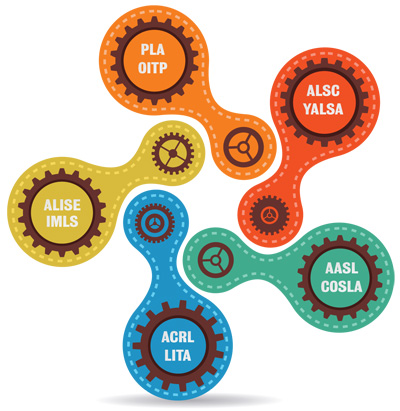To Tackle Major Issues Affecting Kids, ALA Divisions Must Collaborate | The Next Big Thing
 That distant rumble? It’s just me, tearing down the silos that plague the library world. Pick up a sledgehammer and help.
That distant rumble? It’s just me, tearing down the silos that plague the library world. Pick up a sledgehammer and help.
As current chair of the American Library Association (ALA) Office for Information Technology Policy (OITP) Advisory Committee. I work with the incredible OITP staff to explore library and technology issues impacting youth. To be effective, we’ve had to smash through traditional barriers. The issues we face now are too big for one division. We need to step up as part of the whole librarian army.
During the recent ALA Midwinter Meeting, the OITP committee was briefed by representatives from ALA’s American Association of School Librarians (AASL) and Association for Library Service to Children (ALSC). Though the Young Adult Library Services Association (YALSA) rep couldn’t make it, YALSA’s recent action report provided great perspective. Our audience included members from the Library Information Technology Association (LITA), Association of College and Research Libraries (ACRL), Public Library Association (PLA), Chief Officers of Library State Agencies (COSLA) and more. A library school professor who’d been at the Association for Library and Information Science Education (ALISE) pre-meeting was there, with an Institute of Museum and Library Service (IMLS) employee.
I mention all this not just so you can score Bingo! on your ALA alphabet soup card, but also to underscore the importance of bringing together multiple perspectives.
The issues up for discussion had some subtle twists that might not otherwise have been considered. The ALSC speaker, Cen Campbell, spoke eloquently on technology issues impacting the youngest library users. Campbell, founder of LittleeLit.com and a 2014 Library Journal Mover & Shaker, is working to position children’s librarians as media mentors who can help parents explore the implications of screen time for young children. These librarians, Campbell said, need to be media mentors in order to help parents navigate a complex issue.
The American Academy of Pediatrics still advocates for a complete absence of screen time for children under two, a recommendation issued in 1999 to address time in front of cathode ray tubes and VCRs. Times have changed, and screen time today can be much more intentionally interactive. Is it good or bad for a six-month-old to explore stimulus-response experiences by touching an iPad screen and launching fireworks? Does no screen time mean no parents and children reading picture books on tablets? Campbell encourages librarians to model these more intentional interactions of potential parent-child screen sharing during more digitally aware story time programs.
For school librarians feeling the constant pressure of change and digitization—and seeing their jobs expand into new roles—you aren’t alone. Even story time is changing. Librarians who thought they were just going to read books and do craft projects with two-year-olds must adapt to new roles as media mentors and iPad advisors. Teen librarians are expected to know about coding and drill presses so they can run digital and physical maker labs. Public librarians are running programs for aspiring local authors. We are all in a state of flux—which, as hard as it may be, is infinitely preferable to extinction.
We need to find new ways to meet and talk across the three ALA youth services divisions. A source of potential inspiration might be LITA, established around the technology services as opposed to a specific job. Any librarian focused on tech has a second home in LITA, a place and gain new perspectives to bring back to a job-specific mothership like AASL.
If you will excuse the pun: Consider taking down a few silos and joining in on some library cross-pollination. It’s.
RELATED
The job outlook in 2030: Librarians will be in demand
The job outlook in 2030: Librarians will be in demand
ALREADY A SUBSCRIBER? LOG IN
We are currently offering this content for free. Sign up now to activate your personal profile, where you can save articles for future viewing






Add Comment :-
Be the first reader to comment.
Comment Policy:
Comment should not be empty !!!